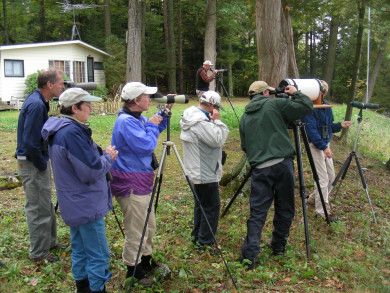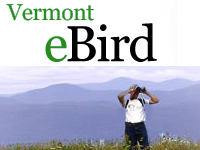 In 2018, we mark the centennial of the Migratory Bird Treaty Act, the most powerful and important bird-protection law ever passed. In honor of this milestone, we’re joining forces with people from around the globe to celebrate the “Year of the Bird,” and recommit to protecting birds now and into the future. Year of the Bird is 12 months of storytelling, science, and conservation aimed at highlighting the importance of birds and their protection. One way in which we hope you’ll join us is through watching birds and reporting your sightings to Vermont eBird.
In 2018, we mark the centennial of the Migratory Bird Treaty Act, the most powerful and important bird-protection law ever passed. In honor of this milestone, we’re joining forces with people from around the globe to celebrate the “Year of the Bird,” and recommit to protecting birds now and into the future. Year of the Bird is 12 months of storytelling, science, and conservation aimed at highlighting the importance of birds and their protection. One way in which we hope you’ll join us is through watching birds and reporting your sightings to Vermont eBird.
A real-time, free online checklist program, eBird has revolutionized the way that the birding community reports and accesses information about birds. Launched in 2002 by the Cornell Lab of Ornithology and National Audubon Society, this year marks the 15 year anniversary of Vermont eBird: the first state portal for eBird. If you are new to birding or just eBird, here’s your chance to get started. If you’re in intermediate user, we’ll answer your burning questions and make you a pro.
On Sunday, January 28th Jason Hill, John Lloyd and Kent McFarland, VCE ornithologists and eBird gurus, will lead a special hands-on workshop for learning to use eBird–the website and the app (Android or IOS). The workshop is from 1pm – 3:30pm and is open to the first 30 registered participants. No prior experience needed!
Every time that you see and identify a bird, you are holding a piece of a global puzzle. Whether you are casually watching birds in your backyard, across the state, or around the world, you are helping to put this puzzle together. It might be a personal puzzle. For example, you might wonder when Red-winged Blackbirds appear in your backyard each spring or how many Dark-eyed Juncos visit your bird feeder each winter. Each time that you identify and report one of these birds, one piece of the puzzle clicks into place.
Unfortunately, just like puzzle pieces, these observations lose their value if they remain separate from one another. The sightings tucked away in your memory, or in your desk drawer, leave gaps in a partially completed picture. In truth, the only way that all these bird sightings make a contribution to our understanding of nature is when they are collected and organized into a central database where they can help complete this picture of birds worldwide.
 Vermont eBird is this database. With thousands of birdwatchers across the continent helping to construct it by contributing their sightings, eBird has become a vast source of bird and environmental information useful not only to bird watchers but to scientists and conservationists the world over. Want to find out what birds you’ll see on your vacation? Want to know the closest spot to find a Least Bittern, or a reliable spot for Townsend’s Warbler? Want to learn when to expect the first Blackburnian Warbler in the spring? Want to see if endangered Least Terns are continuing their decline?
Vermont eBird is this database. With thousands of birdwatchers across the continent helping to construct it by contributing their sightings, eBird has become a vast source of bird and environmental information useful not only to bird watchers but to scientists and conservationists the world over. Want to find out what birds you’ll see on your vacation? Want to know the closest spot to find a Least Bittern, or a reliable spot for Townsend’s Warbler? Want to learn when to expect the first Blackburnian Warbler in the spring? Want to see if endangered Least Terns are continuing their decline?
By keeping track of your bird observations and entering them into the eBird database, you’ll benefit, too. You can access your own bird records anytime you want, allowing you an easy way to look at your observations in new ways and to answer your personal questions about what birds you saw and when and where you saw them.
In this workshop you will learn to:
- keep track of the birds you see (and see more birds!)
- see how to plan birding trips or outings using eBird data
- determine when birds will migrate through the region and find out what species are most common and when
- share checklists with your friends
- understand how eBird data is being used by scientists and the conservation community
- generate tailor-made lists of birds you want to see
- use “eBird Mobile” on your smartphone to track and submit your sightings more easily than ever before
- enter data so that your checklists are the most useful for science and conservation
- enter old data you may have in notebooks
- download data and create data queries for your own use
- understand how the data is reviewed by experts
Bring your list of burning questions too!
Join us at the Vermont Center for Ecostudies (directions) on Sunday, January 28th, 2018 from 1pm to 3:30pm for this free workshop. Pre-registration is required.
Once you register, how can you prepare for the workshop?
- Go to the Vermont eBird website and create a free eBird account.
- Bring your laptop, iPhone, iPad, or Android device to the workshop. If you can, load eBird Mobile on your smartphone or iPad before the class. Having troubles setting up your device? No worries, we’ll help you at the workshop!
- If you don’t own a mobile device or a computer you can still eBird! You can visit a library to enter your data from your field notebook. Bring a pencil and a notebook and you’re all set!
For questions about the workshop, email Kent McFarland at . We hope to see you at the workshop!
